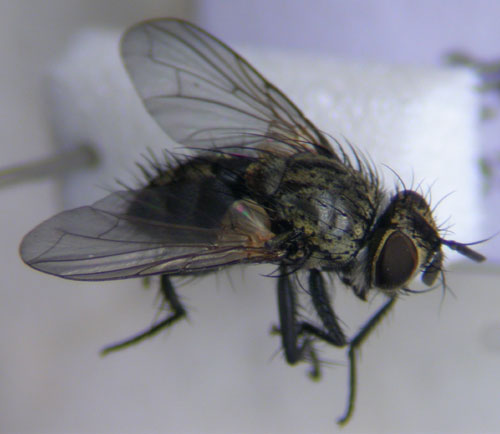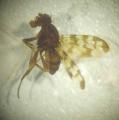Diptera.info :: Identification queries :: Diptera (adults)
|
Phryxe nemea?
|
|
| conopid |
Posted on 26-08-2006 23:24
|
|
Member Location: United Kingdom Posts: 1039 Joined: 02.07.04 |
I need some refereeing of my IDs! Is this Phryxe nemea?
conopid attached the following image:  [28.41Kb] Nigel Jones, Shrewsbury, United Kingdom |
|
|
|
| conopid |
Posted on 26-08-2006 23:25
|
|
Member Location: United Kingdom Posts: 1039 Joined: 02.07.04 |
Another view:
conopid attached the following image:  [43.91Kb] Nigel Jones, Shrewsbury, United Kingdom |
|
|
|
| ChrisR |
Posted on 27-08-2006 09:16
|
|
Super Administrator Location: Reading, England Posts: 7706 Joined: 12.07.04 |
Doesn't look like Phryxe to me - but the photos are a bit dark and indistinct. Looks a bit more like Exorista I think. |
| Zeegers |
Posted on 27-08-2006 09:40
|
|
Member Location: Soest, NL Posts: 19292 Joined: 21.07.04 |
Well, it could be Phryxe nemea, however, the pictures do not show enough details: hairs on eye, scutellar bristles, bristles on legs, thorax, and so on. To be more sure, we need more info on this. Theo Zeegers |
|
|
|
| conopid |
Posted on 27-08-2006 11:57
|
|
Member Location: United Kingdom Posts: 1039 Joined: 02.07.04 |
Hi Theo, Thanks for the response. The fly has a pair of up-standing bristles on the apex of the scutellum at about 45 degrees to the horizontal angle, medio abdominal bristles on tergite 3. I'll have to check the other features again, but really I wanted to check that it does look right for the genus, rather than the specific taxon. I just want to be confident that I have not gone completely wrong in the key (cf my other recent query)!! I am currently building up a reference collection of Tachinids and Dolichopodids, so while I do this it's really useful to get some guidance from Diptera.info correspondents. This site is a God-send! 
Nigel Jones, Shrewsbury, United Kingdom |
|
|
|
| Zeegers |
Posted on 27-08-2006 12:11
|
|
Member Location: Soest, NL Posts: 19292 Joined: 21.07.04 |
Well, the good news is: if it is Phryxe, the species must be nemea (suppposing it is from UK origin). Theo |
|
|
|
| conopid |
Posted on 27-08-2006 19:01
|
|
Member Location: United Kingdom Posts: 1039 Joined: 02.07.04 |
Thanks Theo, Yes it is a UK specimen. That's great news. I got that one right! 
Nigel Jones, Shrewsbury, United Kingdom |
|
|
|
| Zeegers |
Posted on 27-08-2006 19:49
|
|
Member Location: Soest, NL Posts: 19292 Joined: 21.07.04 |
NIgel, You missed the 'if'-part ? Though it could very well be Phryxe, I have not yet reached that conclusion. But within Phryxe only nemea can fit these images. Anyway, Ph. nemea is very common. Try to find a male (this one is a female): the combination of broad vertex in male and erect scutellar bristles is in 99% of the cases Phryxe. Theo |
|
|
|
| conopid |
Posted on 27-08-2006 21:34
|
|
Member Location: United Kingdom Posts: 1039 Joined: 02.07.04 |
Hi Theo, And I have just spotted Chris' comment. I will run it through the keys again and see what conclusion I get 
Nigel Jones, Shrewsbury, United Kingdom |
|
|
|
| Jump to Forum: |













